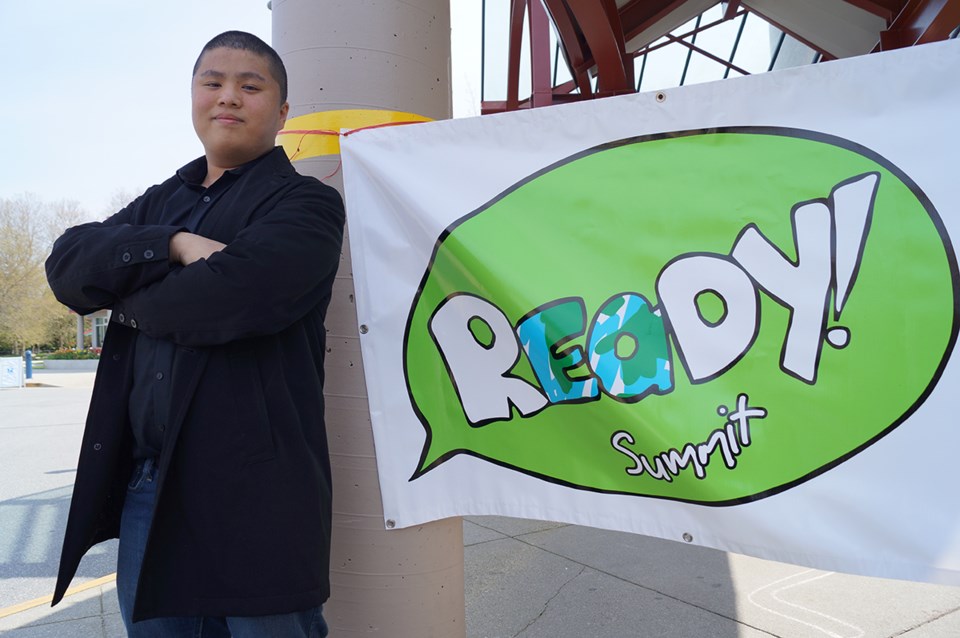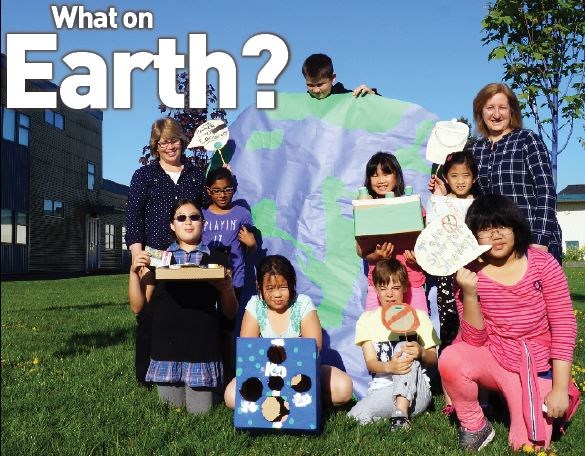As the old saying goes, hope springs eternal. And it especially springs eternal for Woodward elementary teacher Anne-Marie Fenn, who helped celebrate Earth Day on Thursday with her school’s students with Green Games activities.
“The students have a good understanding of the needs facing our Earth today and they are committed to making positive changes. Our future is in good hands!” said Fenn.
As noted by the National Aeronautics and Space Administration, changes to the Earth’s environment are set to produce detrimental effects on human health, society, culture and infrastructure — the impetus for the 46th year of Earth Day.
It’s such bleak news that motivates Fenn to teach young students about environmental stewardship.
The Green Games featured a number of outdoor activities that used recycled materials as props. Students also planted sunflowers in their garden beds to support bees and other vital pollinators, whose populations are declining globally.
“We had 100 per cent student participation and all seemed to thoroughly enjoy themselves while learning,” said Fenn.
Such attitudes and ideas are being put forth to youth throughout the school district in Richmond, such as at this Saturday’s Richmond Earth Day Youth (Ready) Summit at Hugh Boyd secondary. But only time will tell whether this latest round of education will work, granted past generations of youth have failed to curb consumption and pollution — particularly in the developed world — as they become older.
Should NASA’s proven and predicted trends on global warming and climate change continue, Richmond will be Canada’s ground zero for mitigation efforts to combat sea level rise as it falls well below the Fraser River. Other problems will hit close to home, as oceans and rivers warm, salmon stocks are imperiled and B.C.’s forests become tinder boxes. And climate-induced global migrations will only increase.
So, on the whole, how does Richmond stack up in its fight against the perils of climate change?
One Richmondite who has spent the better part of his young life thinking about this is Vincent Chiu, a member of the Green Party of Canada.
Having attended several Ready Summits and now a first-year arts student at the University of B.C., Chiu is hopeful that today’s youth are being given more of an opportunity to participate in environmentalism in Richmond.
He said the summit has evolved to become more youth-led, instead of being organized by adults, with students as sideline observers.

“I’d like to see more programs connecting youth with mentors. Young people don’t have a lot of hard skills or aren't able to see how things work,” said Chiu.
If that happens, kids can relate more to people and their surroundings, instead of simply learning facts about the environment, contended Chiu.
He believes sustainability should mean adapting society and the economy to the environment.
“In the past, we’ve adapted our environment to our society and economy.
“We have to start thinking differently. We’re coming to a limit of what our environment can provide,” said Chiu.
He takes aim at consumer culture that becomes ingrained in youth from an early age, claiming that sustainability is as much about “reimagining” our social and cultural practices. So, instead of spending money on a new TV, perhaps one could spend it on an enjoyable activity. Or, shaping one’s diet by eating less meat and more local food could also benefit the environment, said Chiu, 19.
One thing is certain, according to Chiu: If today’s youth follow in the footsteps of the previous generation, environmental problems will only worsen.
Fellow Richmondite and Green Party member Michael Wolfe, a teacher, is another one of Richmond’s more vocal environmentalists, having run for political seats at each level of government in the city.
“I hear so little in the way of monumental change and kids really getting it. Young people are being brought up with a generation that has lost touch,” said Wolfe, 33.
At the City of Richmond, a team of planners is tasked to implement a series of measures to reduce greenhouse gases.
Wolfe said he’s unconvinced the municipal government is acting as leaders in this area.
“We’re a community of followers when it comes to sustainability practices,” said Wolfe.
However, city spokesperson Ted Townsend said, “we’re pleased with the sustainability projects we’re able to roll out.”
The impetus for Richmond to take action, as noted in a recent report to council, comes from an estimate from the Intergovernmental Panel on Climate Change that the Metro Vancouver area will experience longer, dryer summers, wetter winters, and more extreme storms. With sea-level rise Richmond will need to spend $300 million in 2014 dollars to mitigate flood risk (provincially the costs are expected to near $10 billion).
The city’s goals of greenhouse gas (GHG) reductions are the same as the province’s: reduce community GHG emissions 33 per cent below 2007 levels by 2020 and 80 per cent below 2007 levels by 2050.
The goals are not achievable through city leadership alone, noted Peter Russell, Richmond`s senior manager of sustainability and district energy.
The goals require provincial and federal regulatory changes and funding, market innovation and increasing carbon pricing, notes the report.
The city has taken a number of initiatives, albeit ones that have also been taken in many other B.C. municipalities.
The $23 million Alexandra District Energy Utility will provide geothermal heating and cooling for new condo developments in north Richmond.
Russell noted from 2007 to 2014 Richmond`s population increased by 14 per cent while its natural gas consumption reduced by four per cent and electricity consumption only increased one per cent.
Townsend said its measures such as the city promoting rebates for smart thermostats and energy efficient washing machines that have helped.
The city is also buying more electric vehicles and reducing its energy consumption thanks to new energy efficient buildings.
Russell said it counts corporate GHGs according to provincial guidelines.
It has helped that the city does not include the Richmond Olympic Oval in such calculations. That’s because the Oval is its own corporate entity (thus, it’s excluded from city hall tabs, otherwise it would be the city’s single-largest energy consumer).
Also not a factor in municipal and community energy consumption calculations is new construction, such as new condo towers or home demolitions.
Wolfe contends few, if any, of the city’s efforts are unique.
“You see something happen elsewhere and then Richmond will have a smaller, similar version. There’s never any initiative to go further,” said Wolfe.
“The city signs on to be a solar community, but what does that mean?” asked Wolfe, noting no concrete action has been taken.
“Geothermal energy is good but (condo construction) comes at the expense of a rapid loss of all the other good things nature has provided,” said Wolfe, noting Richmond’s loss of urban green space in many areas.
“City staff and councillors are not leaders. . . But there’s hope in me for the students and the next generation.”



